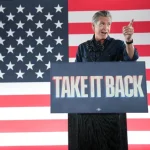

As 2024’s election approaches, presidential candidates will need to present their solutions for how to regulate Big Tech, Silicon Valley, and its pervasiveness in modern society.
From ensuring that China doesn’t dominate cutting-edge technologies to regulating content moderation and free speech, several matters of huge consequence are at stake.
DEMOCRATS OPTIMISTIC AS JULIE SU’S LABOR NOMINATION LANGUISHES IN SENATE
Here’s where the current candidates stand on the following subjects:
- Section 230: A crucial part of communications law that protects websites from being held accountable for what users post to them, this provision has been contested by both sides of the aisle for different reasons in recent years. Conservatives are worried this is used to facilitate censorship, while liberals argue it allows the spread of misinformation
- Antitrust: Many agencies and lawmakers — on both sides of the aisle — say that Big Tech companies are too large and must be broken up or reined in. How to do so is where people often differ.
- Privacy: Protecting user data is a growing concern for Americans. Some members of Congress have introduced bills that would restrict the gathering of data in its various forms, but the legislative push is just beginning.
- Semiconductors: Chips and semiconductors are key components in most tech gadgets. However, they are expensive and access is contingent on international politics. That’s why recently, the federal government and states have attempted to incentivize the construction of factories and research within the United States to increase domestic production. Most notably, Congress last year passed the CHIPS and Science Act, bipartisan legislation providing $280 billion in spending to boost research and development activities, including more than $50 billion for the domestic manufacturing of semiconductor chips.
- TikTok: There’s a growing wave of concern among state and federal lawmakers across the country about the China-owned social media app TikTok. Some are pushing for an outright ban of the app while others are wanting to force it to sell. The White House could be the final say in what happens.
REPUBLICAN CANDIDATES:
Donald Trump: The former president of the United States and leading Republican candidate.
- Section 230: Trump said several times that he wanted to revoke Section 230, claiming that it is used to protect Big Tech companies from being penalized for censoring conservatives.
- Antitrust/breaking Big Tech up: The Department of Justice under Trump launched multiple antitrust investigations into Big Tech companies. Trump argued that the United States should be the one to hold Big Tech companies like Facebook accountable through fines and penalties rather than the European Union, which imposes stricter rules on data privacy and competition. Trump also regularly threatened to use executive orders to “Bring fairness” to Big Tech, although it wasn’t clear what he meant.
- Privacy: One thing that Trump did during his term was repeal Obama-era broadband privacy rules that require internet providers to do more to protect customer privacy, including obtaining consent in exchange for collecting things like geolocation or financial information. He also attacked GDPR, The European Union’s privacy framework, for allegedly protecting cybercriminals.
- Semiconductor/Chips: Trump convinced the Taiwanese chip producer TSMC to build a new chip factory in California. He attempted to curb Chinese access to U.S. chips through export controls.
- TikTok: Trump issued an executive order in 2020 to force the a sale of TikTok to U.S. owners, although the sale was stopped by court orders.
Ron DeSantis: Florida governor.
- Section 230: The Florida governor tried to challenge Big Tech censorship by restricting content moderation decisions and forcing platforms to host political candidates regardless of if their words violated terms of service. He succeeded in signing the bill into law but it quickly met resistance from the courts. The law is currently on hold as the Supreme Court decides if it wants to hear the arguments for it.
- Antitrust: DeSantis called for Google to be broken up, and argued his book for “reining in Big Tech.”
- Privacy: DeSantis signed a “Digital Bill of Rights” into law in June. The Bill prevents Big Tech companies from collecting personal data, such as biometrics.
- Semiconductors: The Florida government under DeSantis invested more than $10 million into supporting the manufacturing of chips.
- TikTok: DeSantis passed several bills limiting TikTok, including bans on using it on state government devices or in schools.
Nikki Haley: Former Governor of South Carolina, former United Nations ambassador.
- Section 230: Has not stated her position on the matter
- Antitrust: Has not stated her position on the matter
- Privacy: Has not stated her position on the matter
- Semiconductors: Haley slammed the CHIPS Act, arguing that that the U.S. should compete through innovation and creativity, not “corporate handouts.”
- TikTok: Haley called for an outright ban of TikTok, stating that it should be banned “everywhere.”
Tim Scott: South Carolina Senator, Republican leader.
- Section 230: When President Trump pushed for the reform of Section 230, Scott said he would “vote with the President” to amend the law if it reached the Senate floor.
- Antitrust: Has not stated his policy on the matter
- Privacy: Has not stated his policy on the matter
- Semiconductors: Scott proposed legislation that would incentivize tax breaks for chip sellers. He also supported the CHIPS Act and voted in favor of it.
- Tiktok: The senator has called for Biden to force the sale of TikTok. He has also introduced legislation that would force apps to reveal their country of origin.
Vivek Ramaswamy: Founder of Roivant Sciences, conservative commentator and critic of corporate culture.
- Section 230: Ramaswamy has called for amending Section 230 to remove the “federal blanket of immunity” for the websites.
- Antitrust: The entrepreneur wishes to take action against Big Tech but claims “standard antitrust laws won’t stop Big Tech’s monopoly on ideas.” He has called for Google and Facebook to be treated as “state actors,” saying they are acting in the interest of the government rather than the people.
- Privacy: Has not spoken on the matter.
- Semiconductors: Ramaswamy called for increased production of chips inside the United States. He also argued alongside former Secretary of State Mike Pompeo that protecting U.S. ally Taiwan was integral to ensuring access to the chips.
- TikTok: Ramaswamy has declared the app a “Trojan Horse” for data collection, but has not proposed particular policy suggestions.
Larry Elder: Conservative radio host and former California Gov. candidate.
- Section 230: Has not stated his position on the matter. Elder has accused Big Tech of censorship, however.
- Antitrust: Has not stated his position on the matter
- Privacy: Has not stated his position on the matter
- Semiconductors: Has not stated anything on the matter
- TikTok: Elder has brought on guests who regularly spoke out about the threat that TikTok posed to the United States, but has not publicly stated his support for a ban of the app.
Asa Hutchinson: Arkansas Governor.
- Section 230: Has not stated his position on the matter
- Antitrust: Has not stated his position on the matter
- Privacy: Has not stated his position on the matter
- Semiconductors: The Arkansas governor supported the passage of a smaller version of the United States Innovation and Competition Act, which was a precursor to the CHIPS Act.
- TikTok: Hutchinson signed legislation banning TikTok from state devices.
Mike Pence: Former Vice President for Donald Trump, former governor of Indiana.
- Section 230: Pence was supportive of efforts by former Attorney General Bill Barr to reform Section 230.
- Antitrust: Has not stated his position on the matter
- Privacy: Has not stated his position on the matter
- Semiconductors: Has not stated his position on the matter
- TikTok: Pence endorsed a congressional ban on TikTok.
Chris Christie: Former New Jersey governor, Trump critic.
- Section 230: Has not stated his position on the matter
- Antitrust: Has not stated his position on the matter
- Privacy: Has not stated his position on the matter
- Semiconductors: Has not stated his position on the matter.
- TikTok: Has not stated his position on the matter.
Doug Burgum: North Dakota Governor, former software company founder.
- Section 230: Has not stated his position on the matter
- Antitrust: Has not stated his position on the matter
- Privacy: Has not stated his position on the matter
- Semiconductors: Has not stated his position on the matter.
- TikTok: Has not stated his position on the matter.
DEMOCRATIC CANDIDATES:
Joe Biden: The current president of the United States and former Vice President under Barack Obama. The leading Democratic candidate.
- Section 230: Biden has called for the removal of Section 230 in order to prevent the spread of misinformation.
- Antitrust/breaking Big Tech up: The president appointed Lina Khan, a well known advocate for “hipster antitrust” and breaking up big companies based on size, to lead the Federal Trade Commission. He also called for legislation to “strengthen antitrust enforcement,” and called for Congress to “unite against Big Tech abuses.”
- Privacy: The president signed orders to ban use of spyware to protect US-EU data privacy and has called for the passage of a comprehensive privacy framework.
- Semiconductor/Chips: Biden signed the CHIPS Act, and pushed for the construction of new chips and semiconductor production plants in the United States. The president also had the Commerce Department restrict Chinese access to U.S. chips through export controls, limiting their ability to innovate — an escalation in a “tech war” between China and the U.S. with each attempting to restrict the other’s access to chips and technology.
- TikTok: Biden has reportedly pushed TikTok’s Chinese owner, ByteDance, to sell the app to an American company but is relying on the Commerce Department or Congress to make the final decision. His staff also have close ties with the company’s lobbyists.
CLICK HERE TO READ MORE FROM THE WASHINGTON EXAMINER
Robert F. Kennedy Jr: Founder of the Children’s Health Defense and well-known vaccine skeptic.
- Section 230: Has not stated his position on the specific law, but regularly criticizes Big Tech for censoring his views on vaccines and COVID-19.
- Antitrust: Has not stated his position on the matter.
- Privacy: Has not stated his position on the matter.
- Semiconductors: Has not stated his position on the matter.
- TikTok: Has not stated his position on the matter.
Marianne Williamson: American spiritual author, former presidential candidate
- Section 230: Has not stated her position on the matter.
- Antitrust: Has not stated her position on the matter.
- Privacy: Has not stated her position on the matter.
- Semiconductors: Has not stated her position on the matter.
- TikTok: Has not stated her position on the matter.





